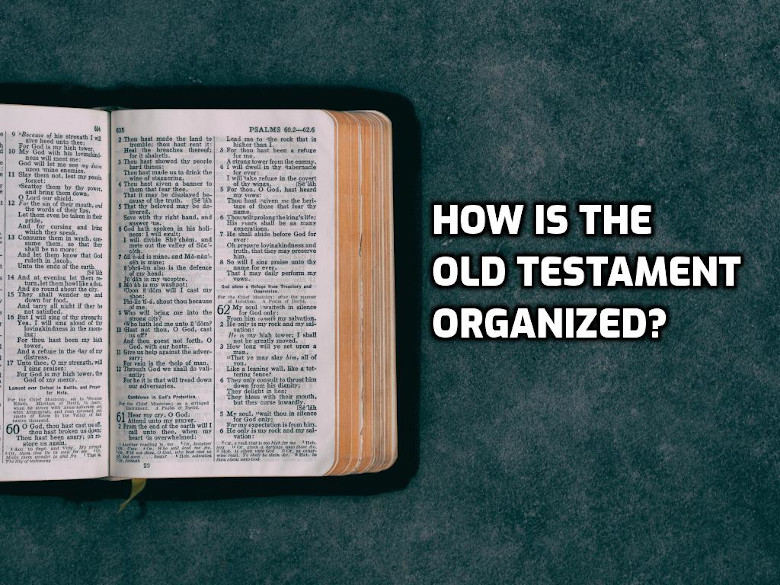Today we divide the Bible between the Old and New Testaments. Books written before the time of Jesus make up the Old Testament. Books written after Jesus’ ministry on earth comprise the New Testament.
The modern English Bible divides the 39 books of the Old Testament into four main parts based on genre. Within each genre, books are organized by author, chronology, and size. The number of books in each division is easy to remember: 5-12-5-5-12.
Modern Christian Old Testament
The Law
Moses wrote the first five books of the Bible. They contain the Law and a good deal of history plus a few speeches and songs. They cover creation, the fall, the flood, Babel, the patriarchs, the Exodus from Egypt, Sinai, and the 40 year wilderness wandering.
- Genesis
- Exodus
- Leviticus
- Numbers
- Deuteronomy
History
The history books begin where the Books of the Law end. They cover the conquest of the Promised Land, the period of the Judges, the united kingdom, the divided kingdom, the Babylonian exile and the return from exile.
- Joshua
- Judges
- Ruth
- 1Samuel
- 2Sameul
- 1Kings
- 2Kings
- 1Chronicles
- 2Chronicles
- Ezra
- Nehemiah
- Esther
Poetry and Wisdom
The Books of Poetry were written in Hebrew poetry rather than narrative.
- Job
- Psalms
- Proverbs
- Ecclesiastees
- Song of Solomon
Prophets
Throughout their history, God spoke to His people through prophets. As a group, the prophets did more than predict the future. They also encouraged the people in times of distress, rebuked and warned them to repent as needed and encouraged them to remain faithful to God.
We call the longer prophetic books the “major” prophets. The shorter “minor” prophets are no less important. They are merely smaller.
Major Prophets
- Isaiah
- Jeremiah
- Lamentations
- Ezekiel
- Daniel
Minor Prophets
- Hosea
- Joel
- Amos
- Obdiah
- Jonah
- Micah
- Nahum
- Habakkuk
- Zephaniah
- Haggai
- Zechariah
- Malachi
The Hebrew Bible
The modern Hebrew Old Testament is divided into three main parts, based on genre. The Jews combine the books of Samuel, Kings, Chronicles, Ezra/Nehemiah and the Minor Prophets into one book for a total of 24 books.
The Jews call the Scriptures the “TaNaKh,” an acrostic of the first letters of the names of the three parts: Torah (the Law of Moses), Nebi’im (the Prophets), and Khethubim (the Writings).
The first two correspond to what Jesus calls “The Law and the Prophets” (Matthew 7:12) or “Moses and the Prophets” (Luke 16:29 Luke 16:31; Luke 24:27). On one occasion (Luke 24:44), Jesus referred to all the writings in the third category as “Psalms,” when he says “The Law of Moses, the Prophets, and the Psalms”.
The Law: 5 books of Moses (Torah)
- Genesis
- Exodus
- Leviticus
- Numbers
- Deuteronomy
The 8 books of the Prophets (Nebi’im)
Former Prophets
- Joshua
- Judges
- Samuel
- Kings
Latter Prophets
- Isaiah
- Jeremiah
- Ezekiel
- The Twelve Minor Prophets
The 11 books of the Writings (Kethubim)
Poetry
- Psalms
- Proverbs
- Job
Rolls (Megilloth)
- Song of Solomon
- Ruth
- Lamentations
- Ecclesiastes
- Esther
Historical
- Daniel
- Ezra
- Nehemiah
- Chronicles
According to the 1st century Jewish historian, Josephus, the Jews recognized 22 books as the Scriptures because the books were grouped differently:
- 5 books of the Law: Genesis, Exodus, Leviticus, Numbers, Deuteronomy:
- 7 books of the Prophets: Joshua, Samuel, Kings, Isaiah, Jeremiah/Lamentations, Ezekiel, The twelve (Hosea to Malachi)
- 10 books of The Writings: Psalms, Proverbs, Job, Song of Songs, Ruth/Judges, Ecclesiastes, Esther, Daniel, Ezra/Nehemiah, Chronicles.
Learn the books of the Old Testament by singing.
Photo by Aaron Burden on Unsplash

